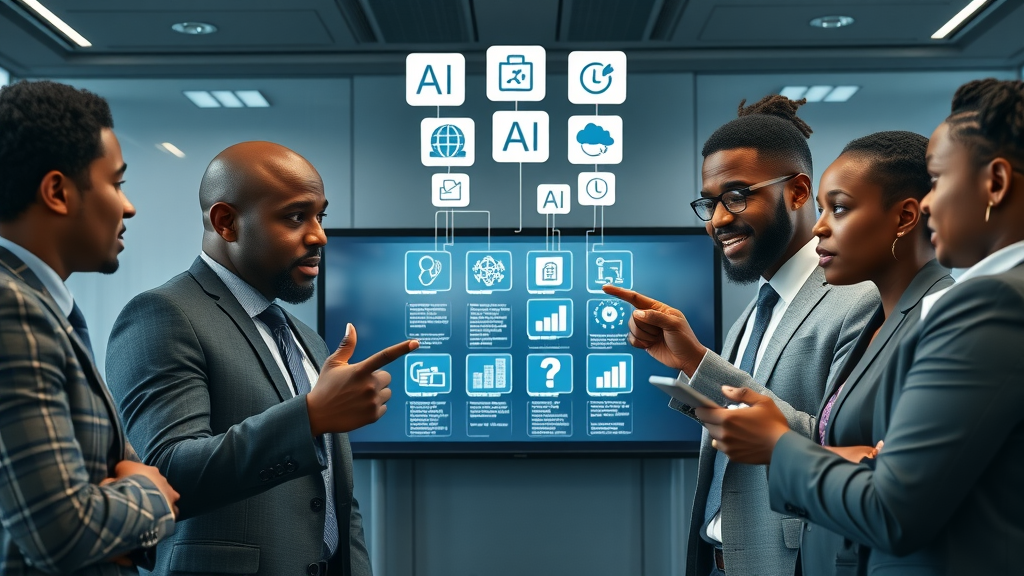Did you know? Artificial intelligence could add up to $1.2 trillion to Africa’s GDP by 2030 . In many sectors, the continent’s AI adoption outpaces global averages—meaning Africa is not just catching up, but in some areas, leaping ahead. As we witness transformative changes in agriculture, health, education, and finance, the AI impact on the African economy is becoming a catalyst for broader, inclusive development. If you want insight into exactly how AI is transforming African markets—and why now is such a crucial moment—this deep dive gives context, numbers, and the perspectives shaping Africa’s digital future.
Unlocking the AI Impact on African Economy: The Surprising Numbers Behind Growth

- Africa’s adoption rate of artificial intelligence is outpacing global averages in some sectors.
- Current estimates show AI could contribute $1.2 trillion to Africa’s GDP by 2030 .
In recent years, the AI impact on the African economy has started attracting global attention. With a youthful and increasingly tech-savvy population, combined with rapid mobile penetration, Africa shows unique readiness to deploy AI solutions at scale. The African Union’s continental strategy has played a pivotal role by prioritizing digital upskilling and AI development across borders. Even more interesting, some African countries are leapfrogging traditional technology phases—as seen in mobile money—leveraging AI tools to improve public services, business efficiency, and agricultural productivity far faster than their global counterparts. These statistics highlight not only potential economic growth but also the urgency for skilled, AI-literate workforces and standardized policy frameworks.
Understanding Why the AI Impact on African Economy Matters Now
- Escalating youth population and tech-savvy demographics
- Strategic initiatives by the African Union
- Africa’s leapfrogging opportunities with AI solutions
Understanding why the AI impact on African economy is so critical today starts with demographics: Africa will have the world’s largest workforce by 2040. Many of these young Africans are “digital natives”—their comfort with technology is already leapfrogging legacy infrastructure. Combining this with strategic digital policies like the African Union’s digital transformation agenda, the continent is set for unique growth opportunities. Additionally, by leapfrogging legacy systems—switching directly from paper to AI-powered mobile platforms, for example—African countries can avoid costly, time-consuming investments in outdated technologies. These conditions set the stage for transformative economic development through artificial intelligence, data science, and digital skills proliferation.
Exploring the Potential of AI to Reshape the African Economy
- Main drivers: innovation, productivity, access to services, and enhanced digital skills opportunities.

The potential of AI to reshape the African economy lies in four major drivers. First is innovation : AI solutions spark local entrepreneurship by automating business operations and opening new markets. Second is improved productivity —AI tools in agriculture, energy, logistics, and manufacturing help businesses become more efficient and competitive globally. Third, access to essential services gets a boost, especially in underserved communities, through applications like telemedicine and mobile banking. Finally, AI development is fueling educational programs that prepare a new generation for high-skill jobs, closing the digital divide. These drivers are reinforced by multi-sector collaborations, from public-private sector partnerships to pan-African AI research hubs.
Artificial Intelligence as a Catalyst: The African Union’s Vision
The African Union’s digital strategy positions AI development as a central pillar for economic competitiveness and pan-African collaboration.
| Sector | AI Solutions | Expected GDP Boost |
|---|---|---|
| Agriculture | Precision farming | $150 Billion |
| Healthcare | Diagnostic tools | $90 Billion |
| Finance | Fintech, fraud detection | $120 Billion |
| Education | Digital learning | $60 Billion |
| Government | Predictive analytics | $90 Billion |
The African Union’s vision is far from theoretical. With initiatives like the Digital Transformation Strategy for Africa (2020–2030), the AU is harmonizing AI policy, promoting data protection, and advocating investments in both digital and physical infrastructure. By targeting agriculture, healthcare, finance, education, and government—sectors that anchor African economies—the AU aims to ensure that AI development directly uplifts average citizens. The projected GDP boosts in the table above reinforce the high stakes and potential returns, urging countries to accelerate adaptation and integration of AI solutions.
AI Solutions in Action: Real-world Examples Reshaping African Markets
Agriculture: AI Solutions Boosting Yields and Food Security

- Crop disease detection using AI
- Satellite data for precision agriculture
- Local startups deploying scalable AI solutions
Agriculture remains the backbone of many African economies; therefore, AI solutions that boost food production have outsized effects. Powered by machine learning and data analytics, AI models help farmers detect crop diseases early, minimize loss, and optimize yields using precision farming tools. For example, agri-tech startups across Kenya and Nigeria are using satellite and drone data to provide farmers with actionable insights on irrigation, soil health, and pest management. These innovations not only heighten productivity but also make farming more resilient to climate variability, reinforcing both food security and economic stability for millions of Africans.
Importantly, these AI applications are not “one size fits all.” From South Africa to Ethiopia, local entrepreneurs are developing AI-driven services tailored to climate, crop type, and scale of farming. The trend underscores how Africa’s unique challenges can drive its most scalable innovations, turning necessity into a launchpad for growth and demonstrating how AI impact on African economy can be truly transformative and homegrown.
Healthcare: AI Solutions Advancing Diagnostics and Public Health
- Telemedicine platforms utilizing artificial intelligence
- AI-driven disease outbreak prediction improving response times

AI adoption in healthcare is reshaping Africa’s ability to provide quality care at scale. Telemedicine platforms—powered by AI models that support smarter diagnostics—enable remote consultations across vast rural areas without adequate medical staff. These AI tools analyze patient records and suggest likely diagnoses, speeding up treatment and reducing misdiagnoses. Furthermore, AI-powered disease surveillance platforms can now track regional health data in real time, predicting outbreaks and deploying resources much faster than traditional systems. This is particularly crucial in areas where public health services are stretched and access remains a challenge.
African health-tech startups are designing AI applications that function on low-bandwidth networks and dominant local languages, making healthcare more inclusive. As these innovations spread—supported by partnerships between ministries of health, international NGOs, and African universities—the potential economic growth from improved health outcomes becomes self-perpetuating. Improved public health not only uplifts individuals but boosts overall productivity, reinforcing the AI impact on African economy across generations.
Bridging the Digital Skills Gap: Building the Workforce for the AI Economy
Without a strong digital skills base, AI impact on African economy will be limited. Up-skilling and ongoing education are crucial to realizing Africa’s AI potential.
Education Initiatives and Digital Literacy Drives in Africa

- Government and private partnerships for digital skills development
- Skill-building platforms integrating AI curriculum
Bridging Africa’s digital divide is as important as deploying new technologies. Edtech startups and government agencies are collaborating to bring coding, robotics, and AI courses into school curricula across the continent. These digital skills initiatives ensure that Africa’s youth not only use AI tools but can develop, test, and commercialize their own AI solutions . Importantly, these programs serve both rural and urban youth, offering offline and mobile-based training modules to reach wider audiences.
Private sector investment is also pivotal here. Global tech firms are partnering with African universities—like the Google AI research center in Ghana—to develop regional expertise in data science , AI model development, and ethical AI use. These alliances lay the foundation for a future-ready workforce, essential to realizing the full potential of AI in local contexts. The commitment to inclusive, hands-on education means that, over time, Africa’s “technology leap” will be accompanied by empowered, skilled citizens ready to build on these advances.
"The full potential of AI in Africa can only be unlocked with inclusive digital education and visionary policies." — Dr. Nneka Okeke, AI Policy Analyst
Potential of AI: Opportunities and Challenges for African Development
- Potential to leapfrog legacy infrastructure
- Risks of automation and job displacement
- AI bias and data privacy concerns

The potential of AI to drive large-scale African development is profound, but so are the challenges. On one hand, AI offers unprecedented opportunities to bypass legacy infrastructure in areas like payments, communication, and public services—a pattern similar to Africa’s rapid leap from no phones to mobile money. The capability to deploy entire digital services natively, at scale, opens fresh possibilities for economic development, even in remote regions.
However, fast-paced AI adoption comes with significant risks. Automation can lead to job displacement, especially in low- and mid-skilled sectors if up-skilling and education don’t keep pace. Ethical issues—like algorithmic bias or data privacy—could entrench rather than narrow inequalities. The proliferation of AI tools requires robust data protection laws and locally relevant regulations. The balancing act between AI regulation , digital inclusion, and economic growth is central to inclusive, responsible AI development on the continent.
How African Governments and the African Union are Approaching AI Development
- Policy frameworks promoting responsible AI
- Continental data-sharing initiatives via the African Union
- Public-private partnerships for localized AI development
Governments across Africa, often coordinated by the African Union , are enacting policies to promote responsible AI adoption. These frameworks are shaped by lessons learned from advanced economies like the United States but are tailored to the African context . Continental initiatives, such as linked digital ID programs and cross-border AI research platforms, promote data sharing while reinforcing sovereign data protection rights. Meanwhile, the rise of public-private partnerships enables quicker deployment of AI solutions by leveraging both local insights and international expertise.
This collaborative governance approach helps mitigate risks and accelerates best-practice sharing. For example, South Africa and Kenya are piloting AI codes of conduct and testing regulatory sandboxes—models that could later be scaled continent-wide. Such measures ensure that the development of AI aligns with Africa’s specific social, linguistic, and market needs, while upholding ethical standards. With the right frameworks, Africa can shape its digital destiny—becoming a global leader rather than simply a technology consumer.
AI Impact on African Economy: The Role of Startups and Homegrown Innovations
- Rising VC interest in African AI startups
- Success stories disrupting health, agriculture, and fintech
- Building local solutions for unique African challenges

The heartbeat of Africa’s AI transformation is local innovation. Across sectors, startups are developing AI solutions that address uniquely African challenges, from voice-based healthcare diagnostics in rural dialects to fintech platforms solving cross-border payments in fragmented markets. As venture capital interest in African AI startups swells, stories of homegrown successes—like South Africa’s AI-driven financial fraud detection or Nigeria’s smart agriculture platforms—are capturing international attention.
These founders are more than coders; they’re system architects blending deep sectoral knowledge with emerging AI models . Critical to their progress are local partners—universities, telecoms, farmers’ cooperatives—who help train, pilot, and refine these tools for maximum relevance and usability. By investing in the development of AI tailored to African languages, regulatory environments, and consumer realities, these entrepreneurs are rewriting the narrative: Africa is not just adopting but inventing the future of artificial intelligence on its own terms.
"Africa's strength lies in its ability to innovate locally with AI solutions tailored to its diverse markets." — Ayo Banjo, Tech Entrepreneur
Scaling AI Development: Overcoming Funding and Infrastructure Bottlenecks
- Financing for AI research and innovation
- Improved cloud infrastructure and data centers
- Collaborations with international tech firms
For AI’s full benefit to be realized, infrastructure must match ambition. Funding gaps in AI research, limited access to cutting-edge cloud computing, and a shortage of reliable data centers are among the biggest bottlenecks. However, this is rapidly changing: major telecoms and international tech firms are investing in African data centers, while public and private grants encourage experimental, high-impact research. Companies like Microsoft and Google are not only bringing infrastructure but offering AI model training and mentorship, creating a vibrant knowledge ecosystem.
Hybrid financing models—blending public research grants, private equity, and cross-border partnerships—are starting to break down systemic barriers. These collaborations don’t just import technology; they empower African countries to set AI strategy and innovation agendas relevant to their populations. If maintained, this support will enable continent-wide scalability and move Africa from being a “testing ground” for imported AI solutions to serving as a cradle for globally relevant, ethical, and highly localized AI applications .
Unlocking Full Potential: What Needs to Happen Next?

- Widespread digital literacy campaigns
- Policy standardization across nations under African Union guidance
- Greater investment in AI incubators and accelerators
- Four Pillars for Accelerated AI Impact on African Economy:
- Digital skills development
- Public and private sector collaboration
- Scalable and ethical AI solutions
- Infrastructure investment
To unlock the full potential of AI in Africa, four pillars are critical: first, robust digital skills and upskilling must become universal, not a privilege. Second, all stakeholders—policy makers, businesses, educators, and communities—must collaborate. Third, scalable, inclusive, and ethical AI solutions should remain the norm, reinforcing public trust and regulatory compliance. Finally, persistent investment in infrastructure—from last-mile internet to state-of-the-art data hubs—will ensure that growth is not only rapid but sustainable. Together, these actions mark the difference between tech hype and true, continent-wide transformation for the AI impact on African economy .
People Also Ask: Addressing Common Questions about AI Impact on African Economy
How will artificial intelligence change jobs in Africa?
AI will both create new jobs and transform existing ones in Africa, especially in sectors like agriculture, healthcare, and financial services. As AI tools automate routine tasks, new roles in data science, AI model training, and technology management are expected to emerge. Workers will need to adapt quickly; upskilling and vocational training are vital to ensure that the AI impact on African economy results in broad-based opportunity rather than displacement. This shift is already visible in countries like South Africa and Kenya where coding bootcamps and AI-focused retraining programs are taking off.
What sectors in Africa benefit most from AI solutions?

Agriculture, healthcare, financial services, and logistics are frontline beneficiaries of AI solutions . These sectors often face challenges of scale, resource scarcity, and inefficiency—problems that are tailor-made for AI model intervention. Using AI to predict crop yields or automate banking has already made significant real-world impact, from higher food security to safer financial transactions. As the adoption of AI tools expands, more sectors like education and public services are expected to benefit—and contribute to the growing economic development in Africa.
Are African governments investing in artificial intelligence?
Yes. Many African governments , in partnership with the African Union, are rolling out national policies, funding pilot programs, and encouraging regional AI collaborations. Initiatives include grants for AI research, cross-border data-sharing agreements, and continental AI strategy sessions to harmonize best practices. South Africa , Nigeria, and Ghana are among the leading countries with targeted investments and regulatory sandboxes for AI-powered industries, setting the stage for coordinated, responsible AI development on the continent.
What are the main risks of rapid AI adoption in Africa?
Job displacement, algorithmic bias, security vulnerabilities, and challenges in scaling digital literacy are the primary risks. Forward-looking AI regulation and inclusive education strategies can help mitigate these dangers. Policy leaders, including the African Union, emphasize transparent, accountable, and localized AI models that reflect Africa’s unique data environment and cultural context, ensuring that growth does not come at the expense of equity and human rights.
FAQs: Key Points about AI Impact on African Economy

- What countries in Africa are leading AI development? South Africa, Nigeria, Kenya, and Ghana are regarded as frontrunners, each having national strategies, thriving tech ecosystems, and strong university research partnerships.
- How will the African Union harmonize AI policies? The African Union is developing a continental AI strategy to standardize regulations, ensure data protection, and support regional innovation hubs—aiming for cohesive, responsible growth across all member states.
- What is the economic value of AI in Africa? AI has the potential to add an estimated $1.2 trillion to the continent’s GDP by 2030 , with agriculture, healthcare, finance, and education driving much of this growth. This reflects a shift from consumption to creation of AI-powered value in the African context.
Reflecting on the AI Impact on African Economy: A View to the Future
- Realizing the full potential of AI in Africa requires collaboration, ethical frameworks, and continued investment.
- If harnessed inclusively, the AI impact on African economy will be transformative, positioning the continent as a global digital leader.
Action: Support digital literacy, foster local innovation, and champion responsible AI regulation. Empower Africa’s AI future—because the next global breakthroughs may start here.
Artificial intelligence (AI) is poised to significantly transform Africa’s economy, with projections estimating a contribution of up to $1.2 trillion to the continent’s GDP by 2030. This growth is driven by AI’s integration across key sectors such as agriculture, healthcare, finance, and education, enhancing productivity and fostering innovation.
In agriculture, AI-powered precision farming tools are enabling farmers to optimize resource use and increase crop yields. For instance, in Kenya, AI-driven technologies have led to a 20% increase in crop yields while reducing pesticide usage by 40%. ( thebftonline.com )
The healthcare sector is also experiencing a revolution through AI applications. AI-driven medical imaging and predictive analytics are improving diagnostic accuracy and reducing misdiagnosis rates by 30%. In Ghana, companies like mPharma are leveraging AI to enhance medicine accessibility and affordability, particularly in remote regions. ( thebftonline.com )
Financial services are benefiting from AI through innovations in mobile banking, credit scoring, and fraud detection. Platforms like Kenya’s M-Pesa utilize AI to detect fraudulent activities and offer personalized financial products, thereby increasing financial inclusion. ( globalsouthworld.com )
Despite these advancements, challenges remain, including infrastructure deficits, data privacy concerns, and the need for robust regulatory frameworks. Addressing these issues is crucial to fully harness AI’s potential for sustainable economic growth in Africa.
For a comprehensive understanding of AI’s transformative role in Africa’s economy, the article “Leveraging AI and emerging technologies to unlock Africa’s potential” provides valuable insights into the opportunities and challenges associated with AI adoption on the continent. ( brookings.edu )
 Add Row
Add Row  Add
Add 




 Add Row
Add Row  Add
Add 

Write A Comment